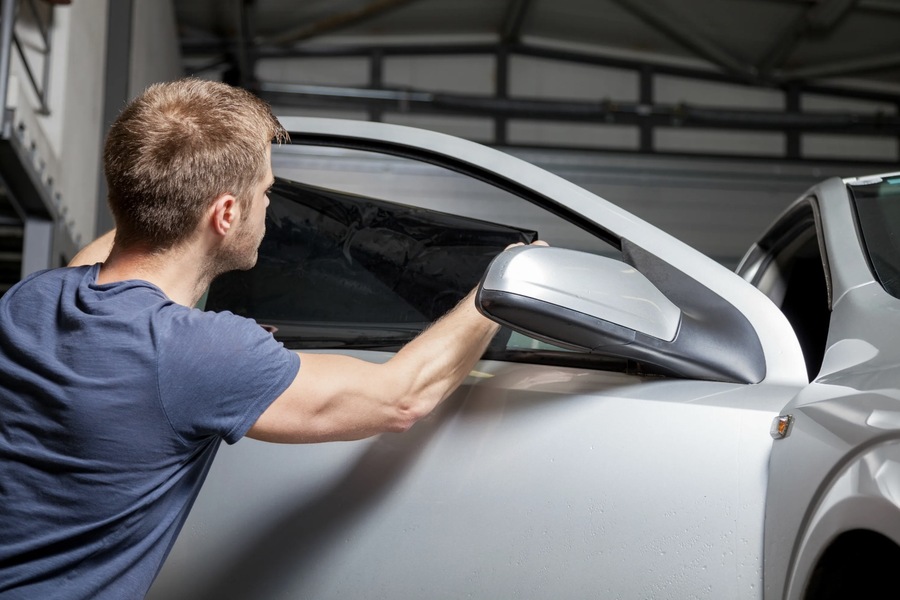Vehicle aesthetics, safety, and interior preservation have long been the key benefits associated with car window tinting. However, one often overlooked aspect is how window tints affect driver and passenger psychology. This article explores the psychological effects of window tinting, delving into whether these tints truly create a calmer driving environment, particularly in the context of Dubai and the UAE, where harsh sunlight and extreme temperatures are common.
Understanding How Window Tints Influence Driver Behavior and Perception
Driving, especially in urban environments like Dubai, can be stressful due to high traffic density, heat, and road rage incidents. Various studies have shown that exposure to direct sunlight can increase irritability and fatigue, reducing driver focus. By blocking out sunlight and glare, tinted windows can alleviate these issues, thereby improving the overall driving experience. Reduced exposure to bright light can contribute to a decrease in eye strain and headaches, promoting a more relaxed state of mind. Furthermore, reduced visibility into the car’s interior provides a sense of privacy, which can help drivers feel less exposed and more comfortable.
Reduced Glare and Its Impact on Cognitive Performance
Glare from the sun or other vehicles’ headlights is a major contributor to driver discomfort and distraction. In a study by the National Highway Traffic Safety Administration (NHTSA), it was found that glare can impair visual clarity and delay reaction times, increasing the likelihood of accidents. Window tints can reduce glare significantly, thereby enhancing visual comfort and allowing drivers to maintain better focus on the road. This enhanced concentration may reduce cognitive fatigue, leading to safer and less stressful driving conditions. For drivers in Dubai, where sunlight is intense year-round, the reduction of glare can make a noticeable difference in day-to-day driving.

Privacy and Security: A Subconscious Sense of Safety
One of the psychological advantages of car window tinting is the sense of security it provides. Drivers often feel safer when they are not easily visible to others on the road. This sense of privacy can help reduce anxiety, making drivers feel more in control. For female drivers or those who frequently navigate through crowded areas, the added privacy can minimize feelings of vulnerability. This can be particularly relevant in the UAE, where expatriates and locals alike value privacy. Knowing that one’s personal space is shielded from external observation can make a driver feel more relaxed and at ease.
Impact on Aggressive Driving Behavior
Aggressive driving is a common issue that contributes to road accidents and unsafe conditions. Studies suggest that environmental factors, including heat and glare, can exacerbate aggressive tendencies among drivers. By minimizing these irritants, window tinting may help reduce the likelihood of aggressive driving behavior. A calm driver is less likely to engage in risky maneuvers, tailgating, or confrontations on the road. This is particularly crucial in regions like Dubai, where the fast pace of life can often manifest in high-speed driving and road rage. Tints may serve as a subtle but effective tool to promote more courteous and patient driving behaviors.
Sensory Regulation and its Role in Creating a Calmer Atmosphere
Sensory overload is a phenomenon that can lead to increased stress and anxiety. When driving in a bustling city environment like Dubai, where there are constant visual stimuli, the brain can quickly become overwhelmed. Window tints act as a sensory filter by reducing the amount of visual information entering the car, thus lowering cognitive load. This allows the brain to process information at a slower pace, leading to a sense of tranquility. A more relaxed sensory environment translates to improved mood and a calmer driving experience, which benefits both drivers and passengers.
Window Tints and the Influence on Temperature Perception
The high temperatures in the UAE, particularly during summer months, are a well-known source of discomfort for drivers. Research indicates that extreme heat can negatively impact mood and cognitive function, leading to increased irritability and impatience. By reducing the amount of heat that penetrates the vehicle, tinted windows can make the interior feel cooler. A cooler environment can reduce physiological stress responses, such as sweating or elevated heart rates, helping drivers remain composed even during prolonged periods of driving in heavy traffic.
Aesthetic Appeal and its Psychological Effects on Driver Confidence
A well-maintained and visually appealing vehicle can enhance a driver’s confidence and self-esteem. While this effect might seem superficial, the psychological impact of feeling good about one’s car can contribute to a more positive mindset. Tinted windows can give a vehicle a polished, professional appearance, which can influence how drivers perceive themselves and their driving. The aesthetic enhancement provided by tints may not directly affect calmness but can contribute to a more enjoyable driving experience, making drivers feel more in control and less stressed.
Cultural Relevance of Window Tinting in Dubai and the UAE
In Dubai, the use of car window tinting is not just about comfort but is also culturally significant. The desire for privacy is deeply rooted in the culture, and tinted windows cater to this preference, especially for families and women drivers. Tinted windows are also associated with luxury and status in the UAE, reflecting the widespread appreciation for high-end vehicles. This cultural acceptance and preference for tinted windows mean that drivers and passengers often perceive tinted cars as more prestigious, which can influence the overall driving environment. Feeling that one’s car aligns with social and cultural norms can foster a sense of satisfaction and well-being, contributing to a calmer state of mind.
The Role of Visual Uniformity in Traffic
Interestingly, the presence of tinted windows on multiple vehicles can also contribute to visual uniformity on the roads. This uniformity reduces visual clutter, allowing drivers to focus more on road conditions and less on the interiors of other vehicles. In cities like Dubai, where luxury cars are abundant, visual uniformity provided by tinted windows can help reduce distractions, promoting a more harmonious and controlled driving environment. This, in turn, leads to less cognitive strain and a more relaxed driving experience for everyone on the road.
Legal Regulations and their Impact on Psychological Comfort
While car window tinting is widely accepted in the UAE, it is governed by specific regulations that dictate the permissible levels of tinting. The UAE’s Federal Traffic Law allows a maximum of 50% tint on the side and rear windows. Compliance with these regulations is crucial for drivers to avoid fines and legal issues. Knowing that one’s vehicle adheres to legal standards provides psychological peace of mind, reducing stress related to potential violations. This legal conformity can contribute to a sense of order and control, enhancing the overall driving experience.
Limitations and Considerations for Using Window Tints
While car window tinting has multiple psychological benefits, it is essential to consider some limitations. Overly dark tints can hinder visibility, particularly during nighttime driving, potentially leading to increased stress and anxiety. It is crucial to strike a balance between comfort and safety. Additionally, drivers should be aware of how their tints might be perceived by law enforcement or other road users, as overly dark tints can create suspicion or lead to misunderstandings. Ensuring that the level of tinting is within legal limits is vital to maintaining a positive and calm driving experience.
Conclusion
By reducing glare, providing privacy, mitigating sensory overload, and lowering interior temperatures, car window tinting can indeed contribute to a calmer driving environment. Collectively, these factors contribute to the improvement of motorist safety and comfort, thereby encourage a more tranquil state of mind. There is evidence to suggest that tinted windows can mitigate several stress-inducing elements that are frequently encountered on the road, although the degree of psychological impact may differ from person to person. The advantages of window tinting are not limited to aesthetics and privacy; they are a valuable addition to any vehicle, particularly for drivers in Dubai and the UAE, where heat and sunlight are significant concerns.
Biker, traveler, drummer, Bauhaus fan and RGD member. Performing at the fulcrum of beauty and mathematics to craft meaningful ideas that endure. Concept is the foundation of everything else.

